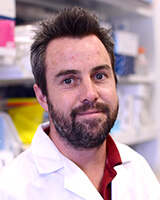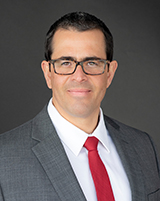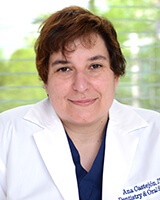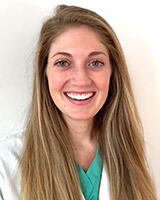 Charles-Antoine “Charley” Assenmacher, DVM, MSc, DACVP, is an Assistant Professor of Comparative Pathology at the Comparative Pathology Core in the Department of Pathobiology. After completing his DVM in 2012 at the University of Liege, Belgium, he went on to do two small animal rotating internships. The first one in the same institution, combined with a Master of Science, and the second one at the Animal Health Trust in the United Kingdom. He then moved to the US to start the Veterinary Anatomic Pathology Residency program at the University of Pennsylvania, which he completed in 2018. Fresh out of residency, and with a strong interest in research pathology, Dr. Assenmacher joined the Comparative Pathology Core (CPC) in 2018, first as a fellow/lecturer, then as a Senior Research Investigator, and finally transitioned to a Faculty position in the summer of 2022. Dr. Assenmacher is the Technical Director of the CPC and is in charge of the Digital Pathology service along with his other duties at the core. In addition to his responsibilities at the CPC, Dr. Assenmacher is also in charge of the ocular pathology diagnostic service at the PVDL and supervises the Anatomic Pathology residents during their autopsy rotations.
Charles-Antoine “Charley” Assenmacher, DVM, MSc, DACVP, is an Assistant Professor of Comparative Pathology at the Comparative Pathology Core in the Department of Pathobiology. After completing his DVM in 2012 at the University of Liege, Belgium, he went on to do two small animal rotating internships. The first one in the same institution, combined with a Master of Science, and the second one at the Animal Health Trust in the United Kingdom. He then moved to the US to start the Veterinary Anatomic Pathology Residency program at the University of Pennsylvania, which he completed in 2018. Fresh out of residency, and with a strong interest in research pathology, Dr. Assenmacher joined the Comparative Pathology Core (CPC) in 2018, first as a fellow/lecturer, then as a Senior Research Investigator, and finally transitioned to a Faculty position in the summer of 2022. Dr. Assenmacher is the Technical Director of the CPC and is in charge of the Digital Pathology service along with his other duties at the core. In addition to his responsibilities at the CPC, Dr. Assenmacher is also in charge of the ocular pathology diagnostic service at the PVDL and supervises the Anatomic Pathology residents during their autopsy rotations.
 Matthew "Matt" Atherton, BVSc, PhD, DECVIM-CA (Oncology), is an Assistant Professor of Immuno-Oncology, with dual appointments in the Departments of Biomedical Sciences and Clinical Sciences and Advanced Medicine. He completed veterinary school at the University of Bristol. Following three years in mixed practice, Dr. Atherton undertook a rotating internship at the Royal Veterinary College. He gained board certification in medical oncology following residency training at the University of Glasgow and was awarded Master of Veterinary Medicine for researching the canine serum proteome in canine lymphoma. Subsequently, he defended his PhD at McMaster University with data from this research enabling “first-in-man” oncolytic virotherapy trials for epithelial malignancies. Dr. Atherton completed post-doctoral training at McMaster and the University of Pennsylvania where he studied novel approaches to cancer immunotherapy prior to starting a comparative oncology lab at Penn Vet in November 2022. The primary focus of the Atherton Lab is dissecting the interplay between the immune system and cancer with a goal of developing next generation adoptive T cell therapies for hematologic malignancies utilizing a One Health approach. As a clinician scientist Matt enjoys seeing general medical oncology patients and is a member of the Comprehensive Care Team at the Ryan Veterinary Hospital where research generated in the lab is used to inform clinical trials for veterinary cancer patients.
Matthew "Matt" Atherton, BVSc, PhD, DECVIM-CA (Oncology), is an Assistant Professor of Immuno-Oncology, with dual appointments in the Departments of Biomedical Sciences and Clinical Sciences and Advanced Medicine. He completed veterinary school at the University of Bristol. Following three years in mixed practice, Dr. Atherton undertook a rotating internship at the Royal Veterinary College. He gained board certification in medical oncology following residency training at the University of Glasgow and was awarded Master of Veterinary Medicine for researching the canine serum proteome in canine lymphoma. Subsequently, he defended his PhD at McMaster University with data from this research enabling “first-in-man” oncolytic virotherapy trials for epithelial malignancies. Dr. Atherton completed post-doctoral training at McMaster and the University of Pennsylvania where he studied novel approaches to cancer immunotherapy prior to starting a comparative oncology lab at Penn Vet in November 2022. The primary focus of the Atherton Lab is dissecting the interplay between the immune system and cancer with a goal of developing next generation adoptive T cell therapies for hematologic malignancies utilizing a One Health approach. As a clinician scientist Matt enjoys seeing general medical oncology patients and is a member of the Comprehensive Care Team at the Ryan Veterinary Hospital where research generated in the lab is used to inform clinical trials for veterinary cancer patients.
 Leonardo Brito, DVM, PhD, DACT, is an Assistant Professor of Large Animal Reproduction in the Department of Clinical Studies—New Bolton Center. He obtained his DVM in 1997 from the Universidade Federal de Uberlândia (Brazil), and completed his PhD in Animal Reproduction (Theriogenology) at the University of Saskatchewan (Canada) in 2006. His research and clinical interests include abnormal spermatogenesis, sperm morphology, semen analysis, and quality assurance in andrology laboratories.
Leonardo Brito, DVM, PhD, DACT, is an Assistant Professor of Large Animal Reproduction in the Department of Clinical Studies—New Bolton Center. He obtained his DVM in 1997 from the Universidade Federal de Uberlândia (Brazil), and completed his PhD in Animal Reproduction (Theriogenology) at the University of Saskatchewan (Canada) in 2006. His research and clinical interests include abnormal spermatogenesis, sperm morphology, semen analysis, and quality assurance in andrology laboratories.
 Ana C. Castejon Gonzalez, DVM, PhD, DAVDC, is an Assistant Professor of Dentistry and Oral Surgery in the Department of Clinical Sciences and Advanced Medicine. She completed her DVM (2001) and PhD (2005) at the Universidad Complutense de Madrid (Spain). She joined Penn Vet in 2014, became a Diplomate of the American Veterinary Dental College (AVDC) in 2017, and Fellow in Oral and Maxillofacial Surgery (AVDC-OMFS) in 2022. Her current research focuses on management of maxillofacial trauma and congenital and acquired palate defects.
Ana C. Castejon Gonzalez, DVM, PhD, DAVDC, is an Assistant Professor of Dentistry and Oral Surgery in the Department of Clinical Sciences and Advanced Medicine. She completed her DVM (2001) and PhD (2005) at the Universidad Complutense de Madrid (Spain). She joined Penn Vet in 2014, became a Diplomate of the American Veterinary Dental College (AVDC) in 2017, and Fellow in Oral and Maxillofacial Surgery (AVDC-OMFS) in 2022. Her current research focuses on management of maxillofacial trauma and congenital and acquired palate defects.
 Erin Gibson, DVM, DACVS-SA, Assistant Professor of Minimally Invasive Surgery, earned her DVM from the University of California-Davis in 2016. Her research interests include minimally invasive surgery (e.g., laparoscopy/thoracoscopy) and identifying/evaluating novel devices or approaches that may optimize minimally invasive surgical outcomes in patients. She is also interested in interventional radiology, including intravascular interventions, tumor embolization, and interventional treatment of upper and lower urinary tract disease.
Erin Gibson, DVM, DACVS-SA, Assistant Professor of Minimally Invasive Surgery, earned her DVM from the University of California-Davis in 2016. Her research interests include minimally invasive surgery (e.g., laparoscopy/thoracoscopy) and identifying/evaluating novel devices or approaches that may optimize minimally invasive surgical outcomes in patients. She is also interested in interventional radiology, including intravascular interventions, tumor embolization, and interventional treatment of upper and lower urinary tract disease.
 Louise Moncla, PhD, Assistant Professor of Pathobiology, received her PhD in Microbiology from the University of Wisconsin-Madison in 2017. Before coming to Penn Vet, she completed a postdoctoral research fellowship at Fred Hutchinson Cancer Center. Her research focuses on how viruses emerge in human populations and transmit between them, and uses tools from phylodynamics, virology, and population genetics to understand how viruses evolve within individuals, between populations, and across continents.
Louise Moncla, PhD, Assistant Professor of Pathobiology, received her PhD in Microbiology from the University of Wisconsin-Madison in 2017. Before coming to Penn Vet, she completed a postdoctoral research fellowship at Fred Hutchinson Cancer Center. Her research focuses on how viruses emerge in human populations and transmit between them, and uses tools from phylodynamics, virology, and population genetics to understand how viruses evolve within individuals, between populations, and across continents.
 Kathleen "Katie" Mulka, DVM, PhD, DACVP, is an Assistant Professor of Anatomic Pathology in the Department of Pathobiology. She earned her DVM at Michigan State University in 2017. Following veterinary school, she completed a residency in Comparative Pathology (2021) and a PhD in Pathobiology (2023) at Johns Hopkins University School of Medicine in the Department of Molecular and Comparative Pathobiology. Her PhD focused on examination of changes in gene expression in the spinal cord of SIV-infected macaques using bulk and single nucleus RNA sequencing. She also helped to characterize the pathology of SARS-CoV-2 and influenza infection in multiple rodent models. Her research interests include diagnostic pathology, molecular and digital pathology, and comparative pathogenesis of viral disease.
Kathleen "Katie" Mulka, DVM, PhD, DACVP, is an Assistant Professor of Anatomic Pathology in the Department of Pathobiology. She earned her DVM at Michigan State University in 2017. Following veterinary school, she completed a residency in Comparative Pathology (2021) and a PhD in Pathobiology (2023) at Johns Hopkins University School of Medicine in the Department of Molecular and Comparative Pathobiology. Her PhD focused on examination of changes in gene expression in the spinal cord of SIV-infected macaques using bulk and single nucleus RNA sequencing. She also helped to characterize the pathology of SARS-CoV-2 and influenza infection in multiple rodent models. Her research interests include diagnostic pathology, molecular and digital pathology, and comparative pathogenesis of viral disease.
 Kevin Niedringhaus, BVetMed, PhD, DACVP, is an Assistant Professor of Wildlife Pathology with Penn Vet's Wildlife Futures Program based at New Bolton Center. He received his BS in Wildlife and Fisheries Biology from Clemson University (2008) and his veterinary degree (BVetMed) from the Royal Veterinary College, University of London (2014). Afterwards, he spent five years at the University of Georgia aiding in wildlife disease diagnostics while obtaining his PhD in Comparative Biomedical Sciences (2019). Dr. Niedringhaus completed a residency in Veterinary Anatomic Pathology at the University of California-Davis and the San Diego Zoo Wildlife Alliance in 2022 and was awarded Diplomat status by the American College of Veterinary Pathologists the same year. His role at Penn Vet is to provide diagnostic pathology services to local wildlife agencies, notably the Pennsylvania Game Commission, as well as assisting the domestic mammal pathology service at New Bolton Center. In addition to diagnostics, his research interests include improving the detection and recognition of infectious diseases in wildlife with an emphasis on emerging and parasitic diseases.
Kevin Niedringhaus, BVetMed, PhD, DACVP, is an Assistant Professor of Wildlife Pathology with Penn Vet's Wildlife Futures Program based at New Bolton Center. He received his BS in Wildlife and Fisheries Biology from Clemson University (2008) and his veterinary degree (BVetMed) from the Royal Veterinary College, University of London (2014). Afterwards, he spent five years at the University of Georgia aiding in wildlife disease diagnostics while obtaining his PhD in Comparative Biomedical Sciences (2019). Dr. Niedringhaus completed a residency in Veterinary Anatomic Pathology at the University of California-Davis and the San Diego Zoo Wildlife Alliance in 2022 and was awarded Diplomat status by the American College of Veterinary Pathologists the same year. His role at Penn Vet is to provide diagnostic pathology services to local wildlife agencies, notably the Pennsylvania Game Commission, as well as assisting the domestic mammal pathology service at New Bolton Center. In addition to diagnostics, his research interests include improving the detection and recognition of infectious diseases in wildlife with an emphasis on emerging and parasitic diseases.
 Antonia Rotolo, MD, PhD, is a Research Assistant Professor in the Department of Pathobiology. She is an internist/hematologist oncologist with clinical expertise in hematopoietic stem cell transplants and over 10-years of research experience in invariant Natural Killer T (iNKT) cell biology and adoptive cell therapies. Dr. Rotolo received her PhD degree at Imperial College London, UK, and subsequently joined the University of Pennsylvania Center for Cellular Immunotherapies to pursue postdoctoral training in Chimeric Antigen Receptor (CAR) immunotherapies. She completed her postdoctoral training in the Mason lab, where she established the first translational canine model of CAR-iNKT cell therapy. Dr. Rotolo is currently a Research Assistant Professor within the Department of Pathobiology. Through comparative immuno-oncology, her studies focus on understanding the cellular and molecular mechanisms underpinning the iNKT paradox, i.e., the ability of iNKT cells to defend against cancer, pathogens and auto/allo-reactive cells by simultaneously suppressing and activating distinct immune subpopulations. Dr. Rotolo aims at leveraging iNKT natural properties to develop more effective, sustainable, and broadly accessible CAR immunotherapies.
Antonia Rotolo, MD, PhD, is a Research Assistant Professor in the Department of Pathobiology. She is an internist/hematologist oncologist with clinical expertise in hematopoietic stem cell transplants and over 10-years of research experience in invariant Natural Killer T (iNKT) cell biology and adoptive cell therapies. Dr. Rotolo received her PhD degree at Imperial College London, UK, and subsequently joined the University of Pennsylvania Center for Cellular Immunotherapies to pursue postdoctoral training in Chimeric Antigen Receptor (CAR) immunotherapies. She completed her postdoctoral training in the Mason lab, where she established the first translational canine model of CAR-iNKT cell therapy. Dr. Rotolo is currently a Research Assistant Professor within the Department of Pathobiology. Through comparative immuno-oncology, her studies focus on understanding the cellular and molecular mechanisms underpinning the iNKT paradox, i.e., the ability of iNKT cells to defend against cancer, pathogens and auto/allo-reactive cells by simultaneously suppressing and activating distinct immune subpopulations. Dr. Rotolo aims at leveraging iNKT natural properties to develop more effective, sustainable, and broadly accessible CAR immunotherapies.
 Holly Stewart, VMD, PhD, DACVS-LA, is an Assistant Professor of Large Animal Surgery in the Department of Clinical Studies—New Bolton Center. She received her veterinary degree in 2012 from the University of Pennsylvania School of Veterinary Medicine. She then did a rotating internship in equine medicine, surgery, and critical care at Pioneer Equine Hospital in Oakdale, California. Following her internship, Dr. Stewart returned to the University of Pennsylvania’s New Bolton Center for a residency in large animal surgery. After her residency, Dr. Stewart completed a PhD at Colorado State University under Dr. Christopher Kawcak. She then stayed as a postdoctoral fellow and research scientist at the Preclinical Surgical Research Laboratory under Dr. Jeremiah Easley at the Translational Medicine Institute at Colorado State University. In January 2023, she returned to New Bolton Center as an Assistant Professor of Large Animal Surgery in the Department of Clinical Studies. Her research is focused on understanding the relationship between subchondral bone and joint health. She is interested in the role of bone marrow lesions and has focused on the development of translational experimental models and optimization of volumetric imaging for the detection of changes within the subchondral bone.
Holly Stewart, VMD, PhD, DACVS-LA, is an Assistant Professor of Large Animal Surgery in the Department of Clinical Studies—New Bolton Center. She received her veterinary degree in 2012 from the University of Pennsylvania School of Veterinary Medicine. She then did a rotating internship in equine medicine, surgery, and critical care at Pioneer Equine Hospital in Oakdale, California. Following her internship, Dr. Stewart returned to the University of Pennsylvania’s New Bolton Center for a residency in large animal surgery. After her residency, Dr. Stewart completed a PhD at Colorado State University under Dr. Christopher Kawcak. She then stayed as a postdoctoral fellow and research scientist at the Preclinical Surgical Research Laboratory under Dr. Jeremiah Easley at the Translational Medicine Institute at Colorado State University. In January 2023, she returned to New Bolton Center as an Assistant Professor of Large Animal Surgery in the Department of Clinical Studies. Her research is focused on understanding the relationship between subchondral bone and joint health. She is interested in the role of bone marrow lesions and has focused on the development of translational experimental models and optimization of volumetric imaging for the detection of changes within the subchondral bone.